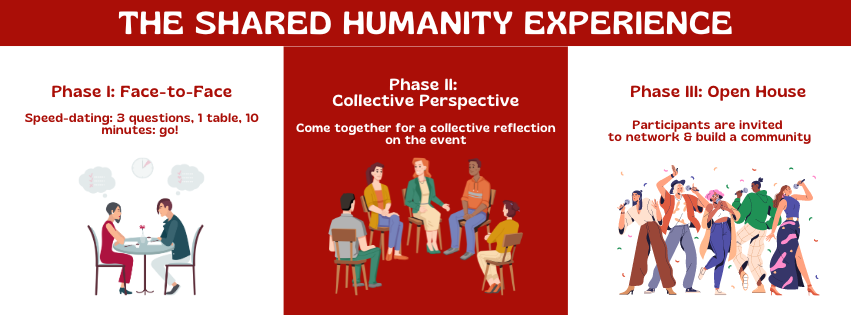The Shared Humanity Experience
Upcoming Event

Winter blues hitting hard? ❄️
Escape the cold and the seasonal slump — we got you.
Expect warmth, people, movement and a spark of motivation to carry into winter.
What’s happening?
🍕 Pizza + snacks to fuel the vibe
🎲 Mini games to shake off the winter slump
🌐 Quick & fun intro to ERUA — projects, ideas, ways to get involved
🧩 Shared Humanity Experience → slow conversations, real connection, human warmth
Think: cosy energy + laughter + new faces + good chaos.
No pressure. Just show up, breathe out winter, and let the evening do the rest.
📅 11 December
🕓 Start: 16:00
📍 fforst
Bring your curiosity.
Unfreeze your social battery.
Let’s make winter feel lighter — together.
Making difficult topics discussable
There are socio-political issues that affect or move us and that we would like to talk about. However, we often hesitate because we are unsure or don't think we know enough about them. These include, for example: sexism, racism, discrimination, prejudice, privilege, gender attributions or dealing with an illness, disability or mental stress.
You may also be wondering where to start these important conversations, especially if you're worried they'll become too controversial or overwhelming.
That's why we've developed a format to help you with this.
The Shared Humanity Experience is a structured exchange format that is fun (yes, fun!) and at the same time offers you a moderated space to talk about challenging topics, reflect and learn together.

We want to create an empowering environment that enables you to address these topics outside of this protected space, in your everyday life and in your studies, and to position yourself on them whenever you want.
The aim is to listen to each other, get in touch and learn from each other.
The selected questions ensure a considerate dialogue and provide a structured approach to navigating complex debates. They allow for direct engagement and encourage purposeful conversations. In addition, they help to redefine our understanding of social dynamics and relationships and can also pave the way for tackling systemic challenges.

Unboxing
Before each Shared Humanity Experience, we stand in the foyer of the canteen at the unboxing stand. Students can ask questions and suggest topics here. That way, we can find out what you've always wanted to talk about!
Join in - we cordially invite all students!
The Shared Humanity Experience is regularly held in English. Discussions in small groups can also be held in German.
Review
Listen. Reflect. Respond.
This event was organized jointly by the Equal Opportunities Department, the Institute for Conflict Management, the student initiative Amnesty International, and the Centre for Teaching and Learning. It provided an open and secured space to ensure dialogue about Middle East war.
Participants shared their perspectives and discussed controversial questions, reflecting on different viewpoints and clarifying the complexity of the conflict. Although varying perspectives became apparent during the different discussion rounds, the exchange fostered new insights and mutual understanding.
The event aimed to offer students an opportunity to engage with current global events and address the growing need to discuss these issues in an academic setting. The goal was to create a platform for open conversation. The Shared Humanity Experience allowed difficult topics to be explored in a respectful atmosphere.
What is the West? What is the East? Why is that important?
This event was jointly organised by the Equal Opportunity Department and the ZLL (Center for Teaching and Learning). It brought together students from Viadrina as well as De Montfort University Leicester (UK) to explore the dynamics between West and East. The discussions covered a range of topics such as politics, power relations, (post-)colonialism, identity, media and more. The discussions allowed participants to challenge their preconceived notions and develop a deeper understanding of the complexity of relations between the West and the East. Overall, the participants showed a high level of enthusiasm for the topic and exchanged ideas and insights in several discussion rounds.
As part of the Diversity Days programme with a focus on "Health", the Shared Humanity Experience addressed the topic of mental health for the first time. The overarching aim was to normalise and destigmatise the topic and create an environment that encourages open and constructive dialogue.
In academia and beyond, prejudice is a barrier to true equality in the workplace, leading to discrimination and inequality. This is not just about stalled careers, but a problem with wider societal implications, affecting our daily lives and social cohesion as a whole. The Shared Humanity Experience aimed to address and challenge these biases in order to promote a fairer and more inclusive professional environment.
The first event of the Shared Humanity Experience Project focused on the analysis of social and cultural systems that sustain phenomenon racism. Awareness of discriminatory mechanisms plays a crucial role in fostering a better understanding of multiculturalism within the community, while simultaneously integrating it into university culture.
The main focus during the event was to engage participants in sharing their experiences and empower each other to find ways how to adress these issues constructively.
Therefore, another aim was to learn how to point out that some behaviors (sometimes due to a lack of knowledge) are racist, and how to set boundaries while also developing solutions for respectful interactions instead.
Contact us
If you have any ideas, suggestions or questions, please contact us!
Michalina Lorych (she/her)
Student Assistant / The Shared Humanity Experience
- AM 110
- Logenstraße 4 | 15230 Frankfurt (Oder)
- +49 335 5534 2587
- chancengleichheit-assistenz@europa-uni.de
Postal address:
European University Viadrina
Equal Opportunity Division
Große Scharrnstraße 59
15230 Frankfurt (Oder)